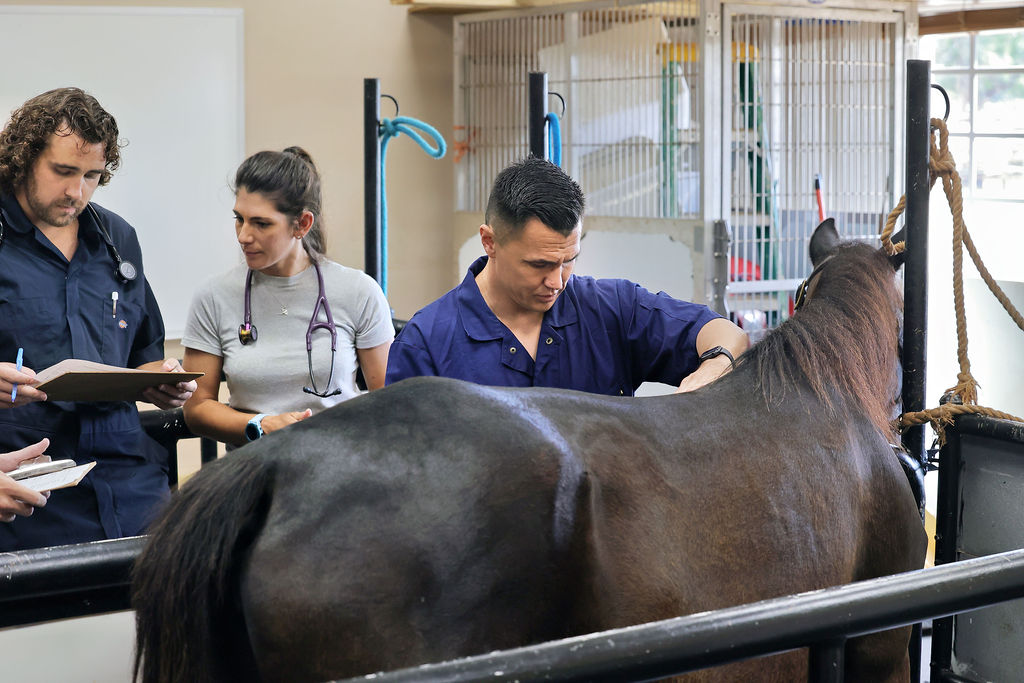
How To Prepare a Strong Vet School Application: Tips, Insights and Requirements
Discover key information that will help you craft a successful DVM application.
Veterinary medicine offers extremely rewarding career opportunities. However, it’s also a highly competitive field. You need a strong vet school application to improve your chances of being accepted into a comprehensive Doctor of Veterinary Medicine (DVM) program, such as the one offered by St. Matthew’s University School of Veterinary Medicine (SMUSVM).
Vet schools want to see a well-rounded individual with a passion for animals, people, science and learning, and this should be reflected in your application.
Before you dive into application writing, it’s important to understand the vet school requirements set by your target institutions. Most schools look for strong academic records, hands-on experience and a clear sense of purpose. Take time to review specific vet school pre-reqs (including coursework in biology, chemistry and animal sciences) and confirm how your background aligns.
Understanding the specific vet school application requirements early on will help you stay organized, confident and ready to meet each milestone in the vet school application timeline. You might also find it helpful to explore our guide to becoming a veterinarian, especially if you’re still clarifying your career direction.
But for now, here are our vet school application tips to help strengthen your chances of being accepted:
The Journey Starts Before You Apply
If you are wondering how to increase your chances of getting into vet school, the road to becoming a veterinarian starts long before you submit your application. You need to demonstrate a track record of being interested in animal care.
The more animal-related experience you can acquire before applying to vet school, the better. Alongside experience in a veterinary environment, you should show that you have experience in working with and caring for animals in general.
This could be shadowing, volunteering or working at farm stables, boarding kennels, rehoming centers or any other relevant experience with animals, such as at wildlife parks.
Vet School GPA Requirements: Why Academic Excellence Matters
Successful DVM program applicants demonstrate academic aptitude and a passion for learning. This means that a strong overall grade point average (GPA) in your post-secondary education program(s) is important. This not only demonstrates what you have already learned, but shows that you are up to the challenge of engaging with a rigorous, science-based veterinary school curriculum.
Required GPA scores for admissions will depend on the specific school you apply to. At SMUSVM, we use a holistic approach to admissions and do not require a minimum GPA score in order to apply. However, the better your GPA, the more likely you will be accepted and receive financial support.



Research On Your Application Matters
Participating in research is not necessarily a prerequisite for veterinary school, but being involved in research, especially in an area you are particularly passionate about, will certainly benefit your application.
Start looking for research opportunities as soon as possible, ideally in your sophomore or freshman year of undergraduate studies. The sooner you can find research opportunities, the longer you will have to get directly involved and achieve meaningful results. Don’t be afraid to contact labs to work as a volunteer or even as a paid lab assistant to help you attain crucial experience.
Work With a Pre-Veterinary Advisor
If you have access to a pre-vet advisor, you should take full advantage of their services, as they can help you greatly with your vet school application. While gaining relevant experiences and good grades are important for getting into vet school, a pre-veterinary advisor can help you polish and enhance your application. After all, every detail matters!
Pre-veterinary advisors are usually ideally positioned to keep up with individual vet school admission processes and requirements, and often have access to up-to-date lists of internships and clinics that let students shadow veterinarians.
Volunteer Whenever Possible
Volunteering is a great way to show your dedication to caring for and working with animals, and is also a useful way to discover whether becoming a vet is the right career for you. It also increases your experience and confidence with animals, and helps you connect with professional contacts.
Ideally, try to volunteer in various places, like small and large animal practices, rescue centers, farms and kennels.
Get Recommendations From Your Teacher/Tutor/Mentor
Vet schools typically require applicants to submit letters of recommendation as part of their application. These letters will be written by people who have supervised your work and can provide admissions committees with valuable insight into your skills, personal qualities and readiness for veterinary medicine.
SMUSVM requires you to provide two letters of recommendation, one from a professional acquaintance and one from an academic source. Letters that have the most impact are those that come from people who have known you for an extended period of time and base their recommendation on personal experiences.
Tell Your Authentic Story
So, how to make your application stand out for vet school?
Your application needs to make the admissions committee aware of your strengths, dedication, experience and achievements. Focus on the impact that volunteering or working with animals has had on you and discuss your contribution to the experience. Approach your experience in terms of how it demonstrates your qualities, including responsibility, maturity, hard work, accountability, calmness under pressure and dedication to service.
Vet schools also want to learn about the real person, so be sure to mention your long-term interests and how they relate to veterinary medicine. Describe your achievements, even those outside animal care. Provide the admissions committee with a full picture of who you are.
Writing a Personal Statement
A strong vet school personal statement does more than list your accomplishments. It tells the story behind them. Admissions teams want to understand your motivations, experiences and long-term commitment to veterinary medicine.
When writing a personal statement, focus on key moments that have shaped your path, and reflect honestly on what you’ve learned from both success and challenges. Use clear, concise language and show how your journey aligns with the mission of the school you’re applying to. And remember, authenticity stands out more than perfection.
Prepare for the Interview
Most veterinary schools will want to meet you before accepting your application. Interviews are a crucial part of the admittance process, helping vet schools assess your personal qualities, which are not always easy to properly portray in a written application.
If you are invited for an interview, you must prepare carefully. It helps if you have creative answers ready for common questions, such as “why are you interested in this vet school?” and “why are you interested in veterinary medicine?”. Interviewers use this conversation as an opportunity to see how you interact with people and assess your motivation, knowledge and ability to think on your feet.
Conclusion
Now that you have explored our tips for developing a successful veterinary school application, it’s time to choose a school to apply to.
St. Matthew’s University School of Veterinary Medicine (SMUSVM) is proud to offer a comprehensive DVM program that features early hands-on training with large, small and aquatic species, dedicated instruction from knowledge faculty, and extensive Student Support Services.
Excitingly, our 10-semester program features Basic Sciences on the beautiful and safe island of Grand Cayman, and Clinical Medicine rotation opportunities in the U.S., Canada and the U.K.. After only 3+ years, successful participants graduate as Doctors of Veterinary Medicine!
To see what that exciting day can be like for you, check out this video recap from Commencement 2025:
If this inspires you, learn more by contacting us or jump right in and start an application today!
FAQs About Vet School Applications
Before applying to vet school, take time to gain relevant animal care experience, research different programs and understand each school’s vet school requirements. You’ll also want to start gathering academic transcripts, references and testing information well in advance.
Most veterinary schools open applications nearly a year in advance. Aim to apply at least two months before your intended start date (January, May or September at SMUSVM), as this gives you the best chance for admission and scholarships. Review each school’s vet school application timeline to avoid missing important deadlines.
It can be competitive. Many students ask, “how hard is it to get into vet school?”, and the answer depends on factors like your GPA, test scores, experience and communication skills. That said, a well-rounded vet application with a strong personal statement and relevant experience can make a significant difference.
Start preparing your application materials six to twelve months before your intended start date. This includes finalising your pre vet school GPA, connecting with potential references about writing letters of recommendation and planning your personal statement. Thinking ahead will help you stay on track and reduce stress as deadlines approach.
Get in Touch for More Information